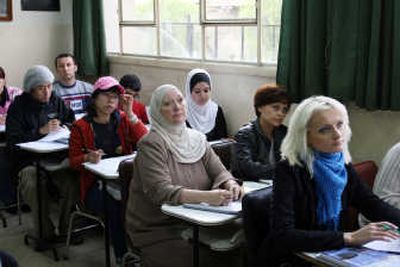Foreign students turning to Syria

DAMASCUS, Syria – It may seem like an unlikely place for students from the United States or Europe, but Syria has been rapidly gaining ground as a destination for foreigners who wish to learn Arabic.
Syrians point to the young foreigners in the capital as proof that their country – which is under U.S. sanctions and on its list of state supporters of terrorism – is not the closed, anti-American rogue nation often depicted in Western media.
The market for learning Arabic could flourish even more if ties between Syria and the U.S. warm after Syria attended last month’s Mideast peace conference in Annapolis, Md.
U.S.-Syrian political wrangling “doesn’t concern me, I’m here to learn Arabic, and this is what I’m doing,” said Alexander Magidow, a 23-year-old student from Minnesota. “I like living here, it’s easy to meet people, the people in general are very friendly and helpful.”
Magidow arrived in June as part of the Center for Arabic Study Abroad program funded by the U.S. Department of Education. He has lived elsewhere in the Mideast and brushes off the stormy politics, though it once worried his family.
“After a year in Jordan, my mom sort of calmed down and wasn’t concerned about it anymore,” he said.
The Center for Arabic Study Abroad, which has long had a program in Cairo, Egypt, opened its first full-year program at Damascus University this year, with eight students – joining a number of other institutes that draw in several thousand foreigners a year.
Arabic studies have generally increased along with the West’s interest in the Middle East since the Sept. 11, 2001, terrorist attacks. The U.S. military and other institutions are seeking more Arabic speakers because of the war on terrorism. Muslim converts or Muslims from non-Arabic-speaking countries are also trying to learn the language of the Quran, Islam’s holy book.
Egypt, a U.S. ally that is more open to the West, remains the biggest draw for foreign students, with thousands studying at the American University in Cairo and smaller private centers.
But Damascus is seeing a growing demand. Syria has gradually been opening up to foreign businesses, meaning an increase in foreign workers who want to know the local language.
But the main reason is simply the discovery that Syria is an option despite the tensions with the West.
“I often get letters from graduates who tell me how much their image of Syria changed after living here,” said Ahmad Haji Safar, director of the Arabic Teaching Institute for non-Arabic Speakers. “They become our ambassadors,” he said.